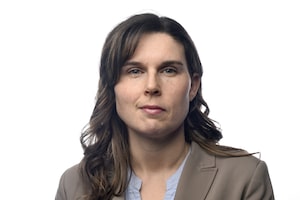Caroline Ouellette of Canada reacts after scoring a goal during first period action of their semi-final game against Finland at the IIHF Ice Hockey Women's World Championship in Burlington, Vermont April 13, 2012. Canada won 5-1 and moves on to play the United States in the final. REUTERS/Herb SwansonHerb Swanson/Reuters
Shannon Miller wonders how the seasoned hockey men coaching Russia's women's Olympic team will feel about taking advice from a 40-something Canadian woman as they prepare their team for the 2014 Sochi Olympics. She'll find out this weekend when she meets with them at the women's world hockey championship.
Miller coached Canada's 1998 women's Olympic team and has since won five NCAA championships as head coach at the University of Minnesota, Duluth. She has been asked to act as a mentor in the International Ice Hockey Federation's ambassador program, which pairs experienced medalists from the Olympics and world championships with developing women's hockey nations in the hopes of improving the level of the women's game worldwide.
The mentor program aims to bridge the gap between the rest of the world and the two North American powerhouses, Canada and the United States, who will once again play for gold on Saturday.
The mentors –from Canada, the United States, Sweden and Finland – help the nations ranked fifth through 14th set up basics such as off-ice training programs and nutritional plans. Many mentors have said there are still some national teams that have players who smoke.
Many of the mentors will share their experiences with each other in a meeting this weekend with the IIHF. How can they help the countries who get little resources from their national federations, and have small pools of players from which to choose their national team? How do they push players from other nations to work harder, put in more hours and believe the effort will be worth it?
"The reality is that no matter how much time you spend mentoring, federations still have to put in the money and the time," said Miller, who notes the federations accepted the mentoring invitation, not the teams directly. "They need the help, and the players deserve it. Some players worldwide will throw their coaches under the bus for their lack of success, and sometimes that's rightfully so, sometimes it isn't. But we'll find out if Russia is serious about putting on a serious showing at the Sochi Olympics with the decisions they make in the next little while."
The Russian team has said it aims to win a medal at the Sochi Olympics. Yet Russia did not win a game in Burlington, Vt., this week despite coming into the tournament ranked fourth in the world. The losses prompted Canadian star Hayley Wickenheiser to criticize Russia's effort publicly. Star Russian player Iya Gavrilova called her team's performance "a total failure."
"I will be thankful for the help," Russian coach Valentin Gureyev said through a translator, visibly agitated after a loss to Sweden. "I'm not happy at all about this tournament, but we are a very young team and of course we still want a medal in Sochi. We are working hard."
Sweden, which dropped to fifth in the world and won't play for a medal this week, came all the way to Burlington and never even got to face Canada or the United States.
"It's not good enough, we need to be better, we want to compete for a medal, to grow women's hockey in Sweden," head coach Niclas Hogberg said. "But we have helped mentor teams behind us so of course they are closing the gap on us. To be honest, we feel a little left out of the mentor program. We could use some help too."
Members of the Finnish team had mused aloud this week about being confident enough to upset Canada and be the first nation other than Canada and the U.S. to appear in a gold-medal final at the worlds. That didn't happen.
Losing to one of the North American powerhouses is not surprising. But when another nation believes it may be able to pull off an upset, now that is new. Arto Sieppi, director of Finland's women's program, thinks his team is close, and he has reason for optimism. They have begun a training program for the best teenaged female players in Finland in Kuortane, four hours north of Helsinki, at a high school that also acts as a training facility for Olympic hopefuls in volleyball, track and field and wrestling. The hockey players are encouraged to go to a U.S. college.
"We won't see the results of it in Sochi, but after those Olympics, I hope to see 10 to 15 players from Kuortane playing on the national team and growing for the next Olympics," Sieppi said.
Former president of the WNBA, Val Ackerman, sat in the crowd Friday, hired by the NHL to observe women's hockey and report back as they strategize how to help grow the women's game.
"My initial observation is that it's a niche, the crowd seems very local and the sport is in the shadows, not visible enough yet, but the NHL is paying attention and wants to use its assets to support its growth," said Ackerman. "Olympic hockey players could be like Olympic gymnasts and figure skaters were to many girls like me growing up. I think we are in a new chapter in the book of women's sports now, one where little girls may start to idolize athletes in team sports -- soccer and basketball and hockey."
 Rachel Brady
Rachel Brady